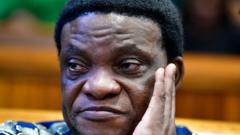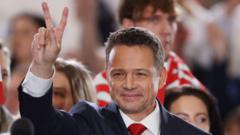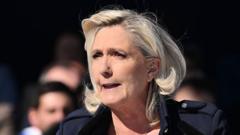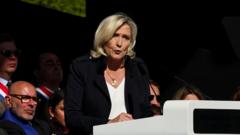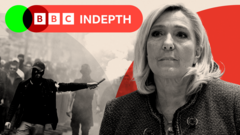Jordan Bardella rallies supporters for a Sunday protest in Paris as Marine Le Pen’s political future hangs in the balance.
**France's Far-Right Mobilizes Following Le Pen's Court Ruling**
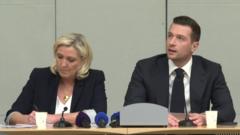
**France's Far-Right Mobilizes Following Le Pen's Court Ruling**
Civil unrest brewing in France amid a high-profile judicial decision against Marine Le Pen.
In a significant political development, Jordan Bardella, the leader of France's far-right National Rally party, has announced a rally scheduled for this Sunday in central Paris. This call to action follows a ruling by judges that imposes a five-year ban on Marine Le Pen, a prominent figure within the party, from running for any public office. Le Pen's aspirations for the presidency in the upcoming 2027 elections have been severely jeopardized by the decision.
The court found Le Pen involved in a significant embezzlement case linked to €2.9 million (approximately $3.4 million) of EU funds misappropriated between 2004 and 2016. Although Le Pen can appeal the ruling, the immediate effect poses substantial barriers to her political ambitions, leaving her with limited time to contest the judgment.
Bardella expressed outrage over the verdict, asserting that the French populace should be similarly incensed. He has called for “democratic, peaceful, calm mobilisations” to take place, with the first gathering planned for Place Vauban, located near the iconic Eiffel Tower.
Le Pen, while attending the press conference, characterized the court's actions as a "nuclear bomb" directed at the National Rally, claiming the ruling was a strategic move by the establishment to undermine their political success, especially given the party's promising prospects in future elections. She encouraged supporters to channel their frustration into perseverance, asserting, “We won’t let them get away with it.”
Bardella vehemently criticized the judicial system, accusing it of tyranny and suggesting that there is a concerted effort to prevent the National Rally from gaining political power. Both leaders condemned any personal attacks or threats directed at the judges involved in the case. Reports from Le Figaro indicated that judge Bénédicte de Perthuis has since received police protection due to threats received in the aftermath of the verdict.
As Le Pen prepares for a potential fourth presidential run despite the ruling, speculation arises regarding her possible successor. While she has indicated unwillingness to step back from her role, Bardella is seen as a significant alternative, albeit one perceived as potentially lacking experience for the presidency at merely 29 years old. Polling data suggests that Le Pen’s supporters might favor Bardella should he enter the race, with a recent survey indicating he could capture up to 36% of the overall vote.
Internationally, Le Pen has garnered backing from notable right-wing figures such as Hungarian Prime Minister Viktor Orban and former U.S. President Donald Trump, the latter describing her conviction as a considerable issue. Italian Prime Minister Giorgia Meloni's comments reflect a shared sentiment among right-wing allies, emphasizing that judicial actions barring major political figures from representing citizens should be seen as a threat to democracy.
Along with the five-year ban, Le Pen faced a €100,000 fine and a four-year prison sentence, of which two are suspended. This ruling will remain unenforceable until the appeals process is concluded, which could extend for several years as the political landscape in France continues to evolve.
The court found Le Pen involved in a significant embezzlement case linked to €2.9 million (approximately $3.4 million) of EU funds misappropriated between 2004 and 2016. Although Le Pen can appeal the ruling, the immediate effect poses substantial barriers to her political ambitions, leaving her with limited time to contest the judgment.
Bardella expressed outrage over the verdict, asserting that the French populace should be similarly incensed. He has called for “democratic, peaceful, calm mobilisations” to take place, with the first gathering planned for Place Vauban, located near the iconic Eiffel Tower.
Le Pen, while attending the press conference, characterized the court's actions as a "nuclear bomb" directed at the National Rally, claiming the ruling was a strategic move by the establishment to undermine their political success, especially given the party's promising prospects in future elections. She encouraged supporters to channel their frustration into perseverance, asserting, “We won’t let them get away with it.”
Bardella vehemently criticized the judicial system, accusing it of tyranny and suggesting that there is a concerted effort to prevent the National Rally from gaining political power. Both leaders condemned any personal attacks or threats directed at the judges involved in the case. Reports from Le Figaro indicated that judge Bénédicte de Perthuis has since received police protection due to threats received in the aftermath of the verdict.
As Le Pen prepares for a potential fourth presidential run despite the ruling, speculation arises regarding her possible successor. While she has indicated unwillingness to step back from her role, Bardella is seen as a significant alternative, albeit one perceived as potentially lacking experience for the presidency at merely 29 years old. Polling data suggests that Le Pen’s supporters might favor Bardella should he enter the race, with a recent survey indicating he could capture up to 36% of the overall vote.
Internationally, Le Pen has garnered backing from notable right-wing figures such as Hungarian Prime Minister Viktor Orban and former U.S. President Donald Trump, the latter describing her conviction as a considerable issue. Italian Prime Minister Giorgia Meloni's comments reflect a shared sentiment among right-wing allies, emphasizing that judicial actions barring major political figures from representing citizens should be seen as a threat to democracy.
Along with the five-year ban, Le Pen faced a €100,000 fine and a four-year prison sentence, of which two are suspended. This ruling will remain unenforceable until the appeals process is concluded, which could extend for several years as the political landscape in France continues to evolve.


